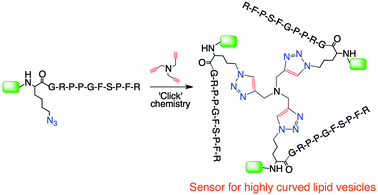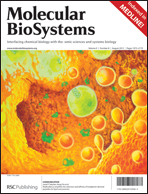Multivalency amplifies the selection and affinity of bradykinin-derived peptides for lipid nanovesicles†
Abstract
The trimer of a bradykinin derivative displayed a more than five-fold increase in binding affinity for phosphatidylserine-enriched nanovesicles as compared to its monomeric precursor. The nanovesicle selection is directly correlated with multivalency, which amplifies the electrostatic attraction. This strategy may lead to the development of novel molecular probes for detecting highly curved membrane bilayers.


 Please wait while we load your content...
Please wait while we load your content...